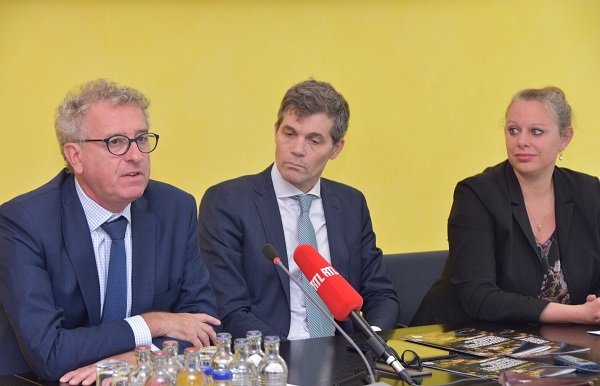 LSFR launch (L-R): Pierre Gramegna, Minister of Finance; Eric Usher, head of the financial initiative of the United Nations Environment Programme; Carole Dieschbourg, Minister of the Environment;
Credit: MFIN
LSFR launch (L-R): Pierre Gramegna, Minister of Finance; Eric Usher, head of the financial initiative of the United Nations Environment Programme; Carole Dieschbourg, Minister of the Environment;
Credit: MFIN
On Thursday 4 October 2018, Luxembourg's Minister of Finance, Pierre Gramegna, the Minister for the Environment, Carole Dieschbourg, and the Head of the Finance Initiative of the United Nations Environment Programme (UN Environment), Eric Usher, presented the new "Luxembourg Sustainable Finance Roadmap" (LSFR) and its recommendations.
Building on recent successes in the area of sustainable finance, the Ministry of Finance and the Department of Environment of the Ministry of Sustainable Development and Infrastructure mandated the UN Environment Finance Initiative in January 2018 to develop a roadmap for sustainable finance, the LSFR. The roadmap was drafted with the support of Innpact, a Luxembourg-based impact-financing specialist, and in close collaboration with the financial sector. The Association of Banks and Bankers Luxembourg (ABBL), the association of the Luxembourg fund industry (ALFI), the professional association of Luxembourg insurers and reinsurers (ACA), the Central Bank, the Financial Sector Supervisory Commission (CSSF), the Luxembourg Stock Exchange all have participated. Furthermore many representatives of the civil society have participated in this open, creative and inclusive process involving various working groups and interview sessions.
The aim of the roadmap is to draw up an inventory of existing initiatives in Luxembourg in the field of sustainable finance, and to lay the foundation for a sustainable finance strategy, contributing to the Agenda 2030 and the objectives of the Paris Agreement. Furthermore, it aims to consolidate the leading role of Luxembourg’s financial centre in the field of sustainable finance. Today, Luxembourg ranks 2nd when it comes to Green Finance penetration, after the UK. This Roadmap is ambitious in terms of Luxembourg’s contribution to sustainable development and to European and international climate initiatives.
The recommendations touch on many aspects of the financial market, such as the development of financial products for sustainable finance, the development of training and education programs for the needs of the financial sector, or the promotion of innovation to facilitate the financing of sustainable development.
In the coming years, the recommendations put forward in the roadmap will have to be supplemented by further analysis, in order to develop a plan of concrete measures to be carried out in the coming years. To achieve this goal, the Ministers announced the establishment of a public-private entity, the "Luxembourg Sustainable Finance Initiative", bringing together relevant actors in the field of sustainable finance and, which will be co-chaired by the Ministry of Finance and the Department of the Environment of the Ministry of Sustainable Development and Infrastructure. The entity will be the ideal forum for developing the National Strategy for Sustainable Finance for Luxembourg based on the key elements of the LSFR. It will also serve as a platform for discussion and analysis of the feasibility and impact of measures stemming from the LSFR recommendations.
Eric Usher, Head of UNEP FI, said: “Luxembourg is setting the course for sustainable finance to fulfil its critical role in achieving sustainable development. Sustainability is increasingly a performance driver, a trillion dollar investment opportunity that needs to be at the heart of the business strategies of banks, insurers and investors. This comprehensive study provides important guidance to Luxembourg, and other countries establishing roadmaps for a sustainable future. Luxembourg is demonstrating leadership by acting on two key recommendations of our report - developing a national sustainable finance strategy and creating a Sustainable Finance Initiative to co-ordinate implementation.”
The Minister of Finance Pierre Gramegna commented: “This roadmap builds on the strong collaborative spirit that exists here in Luxembourg between the financial centre, the government and the civil society in the field of sustainable finance. It is thanks to the efforts of all these actors that Luxembourg has established itself as one of the European leaders in this field and continues to shape the future of sustainable finance”.
The Minister for the Environnement Carole Dieschbourg added: “Implementing the Paris Agreement and the UN 2030 Agenda requires fundamental changes in the global financial architecture. I am convinced that the recommendations contained in this roadmap will contribute to rapidly shifting from high-carbon investments towards energy and resource efficient alternatives, based on renewable energy technologies.”








